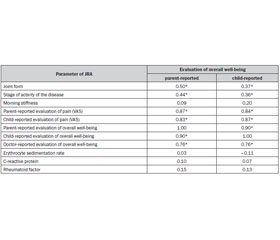Журнал «Боль. Суставы. Позвоночник» 1 (21) 2016
Вернуться к номеру
Results of evaluation an overall well-being in children with juvenile rheumatoid arthritis
Авторы: Pavlishin H., Kovalchuk T., Boyarchuk O. - SHEE «Ternopil State Medical University named after I.Ya. Horbachevsky of the Ministry of Health of Ukraine», Ternopil, Ukraine
Рубрики: Ревматология, Травматология и ортопедия
Разделы: Медицинские форумы
Версия для печати
The article was published on p. 80
In recent years, there has been growing interest in the parent-reported and child-reported assessment of overall well-being in patients with juvenile rheumatoid arthritis (JRA). Integration of these measures in clinical evaluation is considered important as they reflect the parent’s and child’s perception of the disease course and effectiveness of therapeutic interventions. As parents and children are asked with increasing frequency to actively participate in shared decision-making, integration of their perspective in clinical assessment may facilitate concordance with physician’s choices and improve adherence to treatment.


/80.jpg)